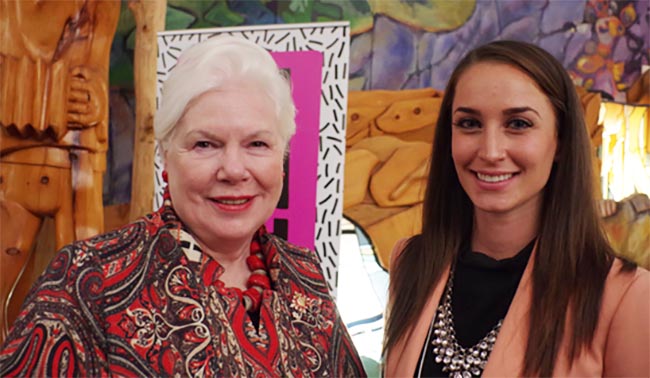Presentation wins Lieutenant Governor’s Visionaries Prize

By Rick Garrick
THUNDER BAY – Mi’kmaq citizen Jessica Rumboldt’s presentation on the over-representation of Indigenous female offenders in the criminal justice system won The Lieutenant Governor’s Visionaries Prize in the Reconciliation category on Sept. 13 in Thunder Bay.
“The fact that Indigenous women are over-represented in the criminal justice system has produced a crisis in need of urgent attention,” says the York University doctoral student. “In 2013, the Office of the Correctional Investigator stated that Indigenous female offenders were even more over-represented than their Indigenous male counterparts. Indigenous women made up 33.6 per cent of all federally sentenced women in Canada. From 1997 to 2007, the population of Indigenous female offenders increased by an alarming 151 per cent. Since 2004, the overall number of Indigenous female offenders has grown by an alarming 90 per cent, establishing this vulnerable population of women as the most growing population behind bars.”
Rumboldt says several factors have been identified that contribute to the over-representation of Indigenous women in the criminal justice system.
“These include the series of adverse effects of colonization as well as the traumatic experiences of the residential school system,” Rumboldt says. “And these factors have influenced the higher rates of violence, poverty and homelessness amongst this population of women.”
Rumboldt says the high number of Indigenous female offenders has resulted in an estimated $1 billion increase in correctional spending.
“Rather than expending this significant amount of money on incarceration, I strongly believe that this amount of money should be used to fund culturally appropriate services and programs that address issues of chronic unemployment, mental illness, child care, affordable housing, violence and poverty,” Rumboldt says. “Addressing these social and economic issues would reduce the amount of crime committed by Indigenous women.”
Rumboldt delivered her presentation along with five other finalists in the Reconciliation competition. Her presentation received the highest votes from the audience members in attendance.
Lieutenant Governor Elizabeth Dowdeswell was impressed with the “very diverse set” of presentations on reconciliation.
“Some talked about health, some talked about education, some talked about maintaining Aboriginal languages,” Dowdeswell says. “They were very courageous in putting their ideas forward and I think very committed to doing (something) on the path to reconciliation.”
Dowdeswell says Rumboldt had “clearly done her research” on the overrepresentation of Indigenous female offenders in the criminal justice system.
“She knew the facts and figures and she had some very concrete ideas to put forward,” Dowdeswell says.
Cynthia Wesley-Esquimaux, a Chippewas of Georgina Island citizen and Lakehead University’s chair on Truth and Reconciliation, says it was a “great event.”
“I’m delighted to see so many young people from across Ontario actually speaking about reconciliation in such a profound way, whether it’s about the academics or about the fact that HIV is still a prevailing problem in the north or the whole question of how the federal or provincial governments treat Indigenous peoples,” Wesley-Esquimaux says. “They’ve actually covered quite a wide gamut of concerns that Indigenous peoples themselves have expressed.”
Lakehead University Bora Laskin Faculty of Law Dean Angelique EagleWoman says the presentations were “very thought-provoking.”
“I thought it was very fitting that (Rumboldt) won and that she talked about the overrepresentation of Indigenous women in the correctional system,” Pelletier says. “I really commend the Lieutenant Governor for her Visionaries Prize and for raising awareness on reconciliation.”
The remaining Visionaries Prize competitions include Governance on Sept. 19 in Kingston, Inclusive Prosperity on Sept. 21 in Windsor, Environmental Stewardship on Sept. 26 in Waterloo, Social Cohesion on Sept. 28 in Brampton and Scientific and Technological Innovation on Oct. 2 in Toronto.


